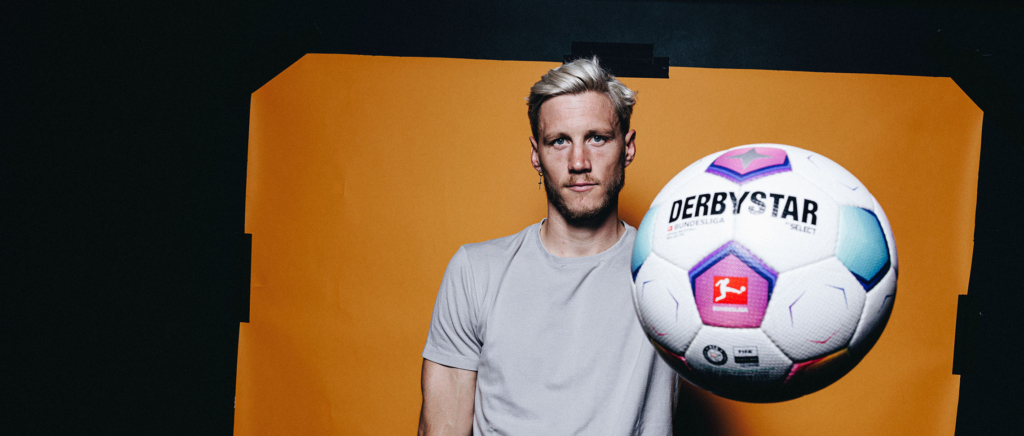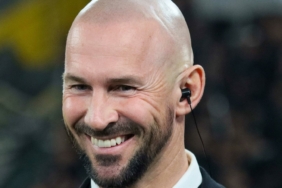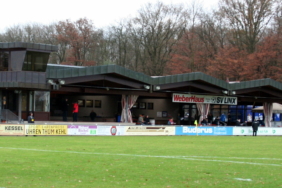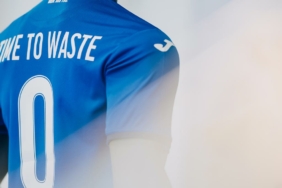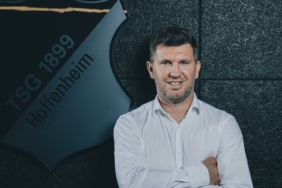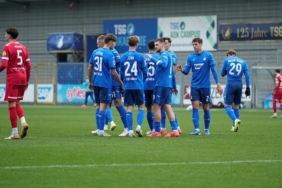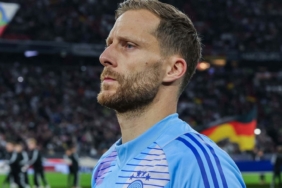Wout, we actually wanted to meet in front of the AVIA petrol station in Hoffenheim for the photo shoot, because your family operates more than 130 petrol stations in the Netherlands. But you decided on a different location. Why?
“My father used to be involved with our village club and it was always said that I only played because he was the main sponsor. I’ve always said that I want to separate the family business and my football career. I am my own person and want to be judged on my performances.”
Do you know the special story of the petrol station in Hoffenheim?
“Yes, of course, that was quickly explained to me here. It also caught my eye straightaway, just as all AVIA petrol stations catch my eye straightaway.” (laughs)
Was making a career out of the family business never an option?
“No.”
Not even when you were playing in an amateur league in the Netherlands?
“You do of course think about it when you’re 18 and still playing village football at not a good level. But nonetheless, I’ve always said that I would become a footballer and would make it. Even when my parents or my family then asked me if I had a Plan B, I was convinced of it. I studied on the side, worked and played football in the evenings. It was a different path, but it was my path. I’ve always believed that I’d be able to get to where I wanted to be through hard work and great effort.”
Was there a moment when you realised it could really work out?
“I’ve always been able to adapt to things very quickly. No matter what level I played at, I could immediately keep up everywhere. Even when I arrived in the first division and we actually had a lot of talented strikers in the Heracles Almelo squad. I was already 21 years old too. But I scored straightaway in my first game in the Eredivisie and I realised: ‘Good, it happens here too.’ We also played against Ajax and after that it was clear to me that I really was a professional footballer now. I had tears in my eyes in that game because it was a very emotional moment for me.”
Were the tears also evidence of the fact that you had to overcome many obstacles?
“I heard very often that I wouldn’t make it and that I wasn’t good enough. I had to fight against that. I was different, different to others. My path was not easy, but for me there was no alternative. For me, there was no other choice than to become a footballer. My mindset is clear: if you want something, you can achieve it.”
Did the voices of the critics spur you on?
“I’ve always been able to give my all in football. It is of course a team sport, but you are responsible for yourself if you want to progress. When I was criticised, I always thought”: ‘Wait, you’ll see.’ And people have seen.”
You said in an interview that you already lived like a professional as an amateur. What did your life look like back then?
“It was more the small details. I was conscious of my diet, went to bed early before games and didn’t party. I lived like that because I always wanted to win and did everything to achieve that. I don’t play football to have a bit of fun, I want to win. That’s when I realised that I tick differently from some others in the village.” (laughs)
And, can you still be a bad loser today?
“That’s the wrong term; I’m not a bad loser. I always want to win but if you lose in the end, that’s just part of the sport. You can accept that sometimes. But it hurts when you try everything to be successful and it doesn’t work out. I have this desire inside of me, I always want to achieve the maximum.”
You played for the Netherlands at the World Cup last year. Was that perhaps the biggest dream that has come true for you?
“That was the absolute highlight, yes. It was crazy. In particular the quarter-final against Argentina, even though we lost on a penalty shootout. I wasn’t even aware of a lot of it, it was only when I saw the pictures that I realised what had happened. I came on when we were 2-0 down, but everything worked out for me. It was like a frenzy.”
You mentioned the game against Argentina: you scored two goals and also scored in the penalty shootout, but you were still eliminated. Do you still look back on that game with pride or is disappointment the prevailing feeling?
“I’ve learned to appreciate moments like that. But of course you still think about it. If we had won, the semi-final would have been against Croatia; we would’ve had a chance there too. The question mark remains about what would have been possible for us if we had survived the penalty shoot-out. But in the end, pride prevailed. When I went to bed afterwards, I knew immediately that this was a very special game for me. I couldn’t sleep for two or three nights.”
But the game is also always associated with your conflict with Lionel Messi. Do you think that’s a shame?
“No. I was just the way I am. And I don’t care whom I’m facing on the pitch. I came on, quickly scored to make it 2-1 and then deliberately sought contact with Messi in a challenge. I wanted to apologise and lift him up, but he didn’t take my hand. Then it got out of hand. But it’s no longer an issue for me. I see it as a compliment that such a great player was upset with me, I earned that on the pitch through my performance. But I’ve always been respectful. I don’t know what I should have done differently.”
Messi called you “bobo” in an interview, which can be translated as idiot or fool. Did that hurt you?
“Absolutely not. When I joined Manchester United, I met Lisandro Martinez, who also won the World Cup with Argentina. In the first training session I noticed straightaway that there was still a certain level of tension; then I called him “bobo” once and the ice was broken. From then onwards, the boys in Manchester always called me “bobo” and then it became a big thing.” (laughs)
Are you someone who sometimes causes trouble?
“That’s hard for me to judge. I’m just me. I am extreme in everything I do. Not only as a footballer; I do everything with pure passion and try to do my best. You do learn of course and as you get older, you also become a bit calmer. But all in all, I don’t worry too much. That’s not always beneficial either, but I’ve never done anything to please anyone. Everything I do, I do out of full conviction. Whether it’s on the pitch or at home with my family.”
You have three daughters, so you’re at home with four women. Is that sometimes demanding?
“I don’t feel under any strain at all, it’s super. I had a lot of dreams as far as football is concerned, whether it was the Premier League or the World Cup. For my private life, I always had one dream: lots of children, preferably four girls. Now there are three, let’s see if there can be one more.” (laughs)
Has starting a family changed you?
“I became a father for the first time when I was 25; that really changed a lot. You see a lot of things from a different perspective. Until that point it was just football, 24 hours a day. I gave everything for it every day and put everything else on the backburner. When my first daughter was born, a lot of things changed. I still have the same ambitions and the same desire on the pitch, but I’m really different on a personal level too. My family is very important to me, they have always accompanied me, even through all the transfers.”
You now live with your family in Germany again. How does it feel to be playing in the Bundesliga again after one and a half years?
“The Bundesliga was a league that suited me well back then. But I always dreamt of playing in the Premier League; that’s why I moved at the time. Thanks to TSG, the opportunity arose to come back to Germany this summer. I’ve always felt at home in Germany and been held in high regard. That’s why I had a good feeling about playing in the Bundesliga again right from the beginning.”
The past year and a half has been very turbulent. You played for Burnley, Besiktas and Manchester United. What have you taken away from that time?
“Despite all the transfers, it was a super experience. I became even more mature and developed not only as a player but also as a person. At Burnley, I played in the Premier League for the first time and fulfilled my dream. In Istanbul, I experienced a passion from the fans that you can’t compare to anything else. And then came Manchester United and my chance to play for one of the biggest clubs in the world. I made a lot of appearances there, so that was another childhood dream that came true.”
How do you look back on your six months in Manchester?
“I went there after the World Cup; it all happened very quickly. I played many games from the start; we won many matches and also the League Cup. But in the end – and I have to admit this to myself – I didn’t score enough goals. As a United striker, you are judged by that. There’s no need to sugarcoat it, two goals in 31 games is not enough. But that didn’t lessen the appreciation from the United fans, because they realised that I always gave 100%. That’s why it was a wonderful time.”
But you still scored a goal at Old Trafford, against Real Betis in the Europa League. Take us into your emotional world after that moment.
“I said in my first interview that I could hardly wait to score my first goal. It normally happens faster for me, but I had to wait a few weeks. But after the goal against Betis, all the emotions came out of me; it was a very special moment for me. It was to remain my only goal at Old Trafford. That makes it special in retrospect.”

Jetzt 11 Ausgaben kostenlos* abonnieren!
(*jahrliche Bezugskosten nur 18,99 €)

